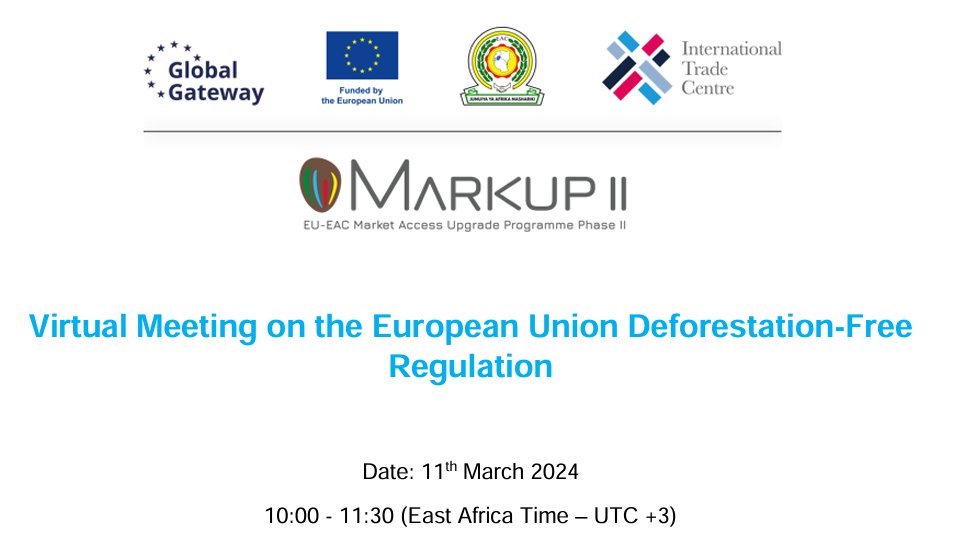21 March 2024. Virtual Meeting on the European Union Deforestation-Free Regulation
In collaboration with the International Trade Centre (ITC), the East African Community Secretariat (EAC) organized this virtual meeting .
The workshop shed light on the main components of EUDR, its origin, and the context of the EU Green Deal, discuss the main- elements of EUDR implementation and the core concepts, among which “Benchmarking”, “Due Diligence Obligations”, “Geolocation of all plots of land”. Participants in the workshop will include policymakers, the private sector, and experts and will be invited to share best practices and insights on how to achieve deforestation-free global value chains and meet the requirements of the EU market.The workshop also seeks to provide a platform for stakeholders from EAC to collaborate and share best practices and challenges along the way to creating more sustainable land use and deforestation-free supply chains.
- Mathieu Lamolle - Senior Advisor Sustainability Standards & Value Chains,International Trade Centre (ITC) Mathieu Lamolle has over 15 years of experience in international trade, market access and sustainable development issues. He holds a master’s degree in international economics and management from the Solvay Brussels School of Economics and Management (SBS)
Background
The Market Access Upgrade Programme (MARKUP II) is funded by the European Union (EU) and runs from 2023-2027. To contribute to economic development in the East African Community (EAC) through increased sustainable intra-African and EU-Africa trade, MARKUP II has been designed to improve livelihoods, employment, export competitiveness for MSMEs and economic growth in Africa through supporting the development and strengthening of key export-oriented priority value chains with high potential. The programme will cover activities in Burundi, Kenya, Rwanda, South Sudan, Tanzania, and Uganda through the provisions of partnerships with national, regional, and international institutions. Among other objectives, the second phase of the MARKUP II aims at strengthening MSMEs’ export competitiveness by enhancing value addition and diversification and by promoting business to the regional and international markets. This includes among others, the identification of market regulations (e.g. EU, regional African country markets), current and foreseen requirements in areas of environment (climate change, deforestation, carbon emissions etc.) as well as social criteria.
Deforestation is a critical global challenge with serious environmental, social, and economic implications. According to the Sixth Assessment Report of the Intergovernmental Panel on Climate Change (IPCC), conservation, improved management, and restoration of forests and other ecosystems offer the largest share of economic mitigation potential, with reduced deforestation in tropical regions having the highest total mitigation potential.
From 2001 to 2015, just seven agricultural commodities – cattle, oil palm, soy, cocoa, rubber, coffee, and plantation wood fibre – accounted for more than a quarter of global tree cover loss, making deforestation-free agricultural commodity production and trade an essential action to address this problem.


No comments:
Post a Comment